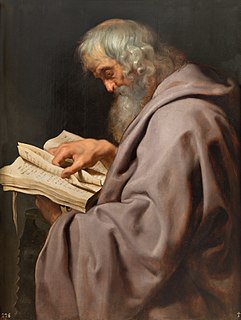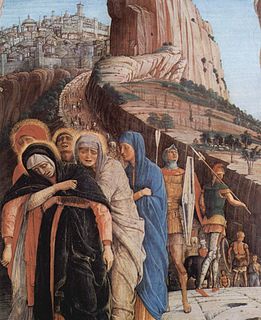
The Epistle of James, the Letter of James, or simply James, is a General epistle and one of the 21 epistles in the New Testament.
Saint James or St. James may refer to:

James the Less is a figure of early Christianity, one of the Twelve chosen by Jesus. He is also called "the Minor", "the Little", "the Lesser", or "the Younger", according to translation. He is not to be confused with James, son of Zebedee. He is identified by some as James, the Lord's brother, thought of by St. Jerome and those who followed him as really the cousin of Jesus. James the Less was traditionally commemorated with St. Philip on May 1st in the Western calendars.

James the Just, or a variation of James, brother of the Lord, was a brother of Jesus, according to the New Testament. He was an early leader of the Jerusalem Church of the Apostolic Age. He died as a martyr in AD 62 or 69.

Simon the Zealot or Simon the Canaanite or Simon the Canaanean was one of the most obscure among the apostles of Jesus. A few pseudepigraphical writings were connected to him, but Saint Jerome does not include him in De viris illustribus written between 392–393 AD.

Cleopas, also spelled Cleophas, was a figure of early Christianity, one of the two disciples who encountered Jesus during the Road to Emmaus appearance in Luke 24:13–32.

Jude, also known as Judas Thaddaeus, was one of the Twelve Apostles of Jesus according to the New Testament. He is generally identified with Thaddeus, and is also variously called Jude of James, Jude Thaddaeus, Judas Thaddaeus or Lebbaeus. He is sometimes identified with Jude, the brother of Jesus, but is clearly distinguished from Judas Iscariot, the apostle who betrayed Jesus prior to his crucifixion. Catholic writer Michal Hunt suggests that Judas Thaddaeus became known as Jude after early translators of the New Testament from Greek into English sought to distinguish him from Judas Iscariot and subsequently abbreviated his forename. Most versions of the New Testament in languages other than English and French refer to Judas and Jude by the same name.
Clopas is a figure of early Christianity. The name appears in the New Testament, specifically in John 19:25:
Near the cross of Jesus stood his mother, his mother's sister, Mary the wife of Clopas, and Mary Magdalene.
Alphaeus is a man mentioned in the New Testament as the father of two of the Twelve Apostles, namely:
In the Acts of the Apostles, Joseph Barsabbas is one of two candidates qualified to be chosen for the office of apostle after Judas Iscariot lost his apostleship when he betrayed Jesus and committed suicide. After the casting of lots he was not chosen, the lot instead favoring Matthias to be numbered with the remaining eleven apostles.

According to the Gospel of John, Mary of Clopas was one of the women present at the crucifixion of Jesus and bringing supplies for his funeral. The expression Mary of Clopas in the Greek text is ambiguous as to whether Mary was the daughter or wife of Clopas, but exegesis has commonly favoured the reading "wife of Clopas". Hegesippus identified Clopas as a brother of Saint Joseph. In the Roman Martyrology she is remembered with Saint Salome on April 24.

Matthew 10 is the tenth chapter in the Gospel of Matthew in the New Testament section of the Christian Bible. Matthew 10 comes after Jesus had called some of his disciples and before the meeting with the disciples of John the Baptist. This section is also known as the Mission Discourse or the Little Commission, in contrast to the Great Commission. The Little Commission is directed specifically to the Jewish believers of the early church, while the Great Commission is to all nationalities. The Pulpit Commentary suggests that Jesus' message in this discourse "was hardly likely to have been remembered outside Jewish Christian circles".

Luke 6 is the sixth chapter of the Gospel of Luke in the New Testament of the Christian Bible. Jesus' teaching about the Sabbath enrages the religious authorities and deepens their conflict. The selection of twelve apostles is recounted and this is followed by the "Sermon on the Plain", where key aspects of Jesus' teaching are presented.

Jude is one of the brothers of Jesus (Greek: ἀδελφοί, romanized: adelphoi, lit. 'brethren') according to the New Testament. He is traditionally identified as the author of the Epistle of Jude, a short epistle which is reckoned among the seven general epistles of the New Testament—placed after Paul's epistles and before the Book of Revelation—and considered canonical by Christians. Catholics and Eastern Orthodox Christians believe this Jude is the same person as Jude the Apostle and that Jude was perhaps a cousin, but not literally a brother of Jesus, or perhaps St. Joseph’s son from a previous marriage.

Matthew 27:55-56 are the fifty-sixth and fifty-seventh verses of the twenty-seventh chapter of the Gospel of Matthew in the New Testament. The crucifixion and death of Jesus have just occurred, and these verses make note of a group of women who were present at that event.

James, son of Alphaeus was one of the Twelve Apostles of Jesus, appearing under this name in all three of the Synoptic Gospels' lists of the apostles. He is often identified with James the Less and commonly known by that name in church tradition. He is also labelled "the minor", "the little", "the lesser", or "the younger", according to translation. He is distinct from James, son of Zebedee and in some interpretations also from James, brother of Jesus. He appears only four times in the New Testament, each time in a list of the twelve apostles.

Mary is identified in the synoptic gospels as one of the women who went to Jesus' tomb after he was buried. Mark 16:1 and Luke 24:10 refer to "Mary the mother of James" as one of the women who went to the tomb. Matthew 27:56 says that "Mary the mother of James and Joseph" was watching the crucifixion from a distance. Mark 15:40 calls her "Mary the mother of James the younger and of Joses" (NKJV). James the younger is often identified with James, son of Alphaeus. The Catholic Encyclopedia identifies him with both James, son of Alphaeus and James the brother of Jesus.

The commissioning of the Twelve Apostles is an episode in the ministry of Jesus that appears in all three Synoptic Gospels: Matthew 10:1–4, Mark 3:13–19 and Luke 6:12–16. It relates the initial selection of the Twelve Apostles among the disciples of Jesus.

In Christian theology and ecclesiology, apostles, particularly the Twelve Apostles, were the primary disciples of Jesus according to the New Testament. During the life and ministry of Jesus in the 1st century AD, the apostles were his closest followers and became the primary teachers of the gospel message of Jesus.














